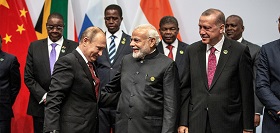Following the inauguration of Brazilian President Jair Bolsonaro, who is known for his pro-American views, the already meager Russian-Brazilian relations can now be compared to a toss of a coin. This is in stark contrast to the rapid dynamics of Russian IT companies, which have been breaking into the Brazilian market independently, quite successfully, and despite the political situation. Russian IT specialists and solutions enjoy great demand in the Brazilian commercial sector, which lags somewhat behind Europe and the US in introducing digital technologies on a broad scale. Also, South America’s catch-up development model is conducive to investment in areas where Russian companies have long been strong and well-established on the world market. To learn how the Russian IT sector feels, halfway across the globe, we interviewed its representatives and compiled this small selection of successful cases with special focus on promising trends in the foreseeable future.
Why Brazil?
This may come as a surprise to Russian readers, who mainly associate Brazil with tourism and football, but the country is among the world’s ten biggest markets for investment in IT. The US consultancy International Data Corporation (IDC) reports that, in 2018 [1], Brazil ranked ninth by this parameter with a total of $46.6 billion in investment. Also in 2018, the Brazilian IT sector grew by 9.8%, which is significantly faster than the global average of 6.7%. Brazil came first in Latin America last year, followed by Mexico with just under half the investment level at $21.7 billion.
The same IDC study says the Russian IT market was growing much faster until recently, at up to 16.5% per year. There is, however, an important nuance: in terms of investment in the sector, Russia lags significantly behind Brazil. The specifics of the Russian legislation, domestic consumers’ low incomes, state-owned companies, and government agencies with their sometimes unorthodox approaches to choosing IT suppliers, difficulties in attracting investments and limited export opportunities for Russian IT firms due to Russia’s international isolation all combine to reduce domestic business opportunities dramatically. As a result, the IDC suggests the Russian IT industry will only grow 3.7% in 2019 against a world average of 4.9%. While, in the previous years, domestic growth opportunities were already very scant, the current circumstances make market diversification crucial for further development of competitive companies.
Given the cut-throat competition in the IT sector, businesses find it easier to break into and grow on booming markets, such as Brazil. In 2019, its IT sector is expected to grow by 10.5% (making the country the world’s eighth fastest growing IT power and second in Latin America after Argentina). At the same time, in terms of investment structure, Brazil is closer than Russia to developed countries, where less money is invested in developing hardware in percentage terms than in creating new software and services (the exact opposite of the situation in China). In 2018, the total IT investment in Brazil was distributed as follows: 51% ($24 billion) went into hardware; 26% ($12 billion) into services, and 22.5% ($10.5 billion) into software. Russian companies, whose main competitive advantage lies in their strong programming skills inherited from the established Soviet mathematical school, should find this ratio particularly interesting.
In addition, Brazil is experiencing an acute shortage of qualified professionals. A study by the US company Cisco indicates that the Brazilian IT market has 449,000 potential specialist vacancies. Brazil is rarely an attractive destination for expats from developed countries, but specialists from Russia, China, and India might find what it offers quite competitive in terms of both salaries and living standards.
It should also be noted that the IT segments growing particularly in Brazil are those where Russian businesses can be quite competitive. These include information security (expected to be the fastest growing segment in 2019) and cloud technologies (fourth fastest growing).
There is an explanation for that. Brazil ranks first in the world for phishing attacks. The country also sees a huge number of hacker attacks on financial institutions and needs to protect its critical infrastructure. According to Reuters, Brazilian companies spend some 5% of their annual profit on combatting financial fraud. The figure is much higher than the global average of 3.1%. Small wonder, as cybercrime has climbed to the top position among all types of financial fraud in the country, at 19%.
Pietro Delai, who led the IDC study, says that $671 million will be allocated for IT security in Brazil in 2019, increasing the sector’s investment growth rate 2.5-fold compared to traditional IT segments. Most of this sum ($548 million) will be spent on managed security services: an advanced approach to ensuring information security when the consumer buys continuous security for their IT infrastructure rather than an off-the-shelf product.
Cloud technologies in Brazil will mostly be growing thanks to the public cloud infrastructure. The IDC estimates the growth to reach 35.5% in 2019 and believes investment in the sector will amount to some $2.3 billion over the same period. This tremendously fast growth rate is explained by the low base effect. The cloud service sector presents good opportunities for market entry and investment, which, Delai believes, will have reached $5.8 billion by 2022.
Information security
The Brazilian information security market is populated particularly by Russian companies. There are several explanations for this: the market’s breakneck growth, a plethora of competitive Russian solutions, and also the fact that Brazil is not restricted by the anti-Russian sanctions.
Kaspersky Lab
The world-renowned Russian IT security provider Kaspersky Lab has long been known in Brazil. Back in 2006, the company launched sales there through a distributor; it opened a representative office in Brazil in 2012, which subsequently started working with all Latin America.
Kaspersky Lab does not disclose its sale figures for Brazil or the names of its major clients. The Brazilian Armed Forces remain the only national government agency so far to have signed a major contract to use the Russian firm’s anti-viral software and associated services.
That contract, announced in 2017 and performed through the local distributor EsyWorld, has become a major success for Kaspersky on the Brazilian market. Brazil’s ground troops, air force and navy have used the company’s products ever since.
Kaspersky Lab began installing its software on Brazilian military computers in 2016. Some 120,000 workstations have been fitted with the Russian antivirus to date. Kaspersky is responsible for compiling reports on any existing cyberthreats, monitoring and reacting to incidents.
In return, Brazil paid Kaspersky Lab 8.4 million reals (slightly over $2 million at the current exchange rate) out of the state budget. The contract is to end soon and, in the current political situation, it is unclear whether it will be prolonged. Kaspersky Lab was not available for comment on the company’s current status and business prospects on the Brazilian market.
Overall, 2018 was not the best year in Latin America for Kaspersky. The company’s news release says its sales in the region declined by 11%, explaining this by fluctuations in the exchange rates of the national currencies.
SearchInform
Another Russian company supplying information security solutions to Brazil is SearchInform. Unlike Kaspersky Lab, which is a global giant offering products in both the B2C and B2B segments, SearchInform focuses on the corporate market. The company’s flagship product is the Data Loss Prevention (DLP) system. Conventional DLP systems prevent confidential information from leaking from a corporate network. SearchInform offers broader functionality: in addition to protecting information within the client’s company, it also safeguards it from financial losses associated with malignant or erroneous activities by personnel.
The company started marketing in Brazil in 2016; until its representative office was opened in 2018, it operated on the local market through distributors.
SearchInform sources say the Brazilian experience has corroborated the high demand for the company’s IT security services. According to Vladimir Prestes, country manager for Brazil, in the very first week of its operations, the country office fielded over 15 product demonstration and testing requests.
This is how SearchInform CEO Sergey Ozhegov describes the company’s launch on the Brazilian market [2]: “During the first year, we introduced several products in order to learn how to work the market and what customers needed. Since an average contract for our products takes around 12 months to sign, we were not aiming for any significant immediate results during that first year. Rather, we were looking to set up a partnership network. That network has since been established and is operating successfully.”
Ozhegov notes that the company is currently primarily targeting private businesses, which “have shorter decision-making times.” The next step will involve courting the government sector.
Speaking of the difficulties navigating the Brazilian market, Ozhegov mentioned the local tax legislation, problems associated with importing and withdrawing funds, as well as currency exchange inconveniences: “The country features one of the most complex tax policies we have ever encountered. For example, there are two different internal tax schemes. Withdrawing earnings from Brazil is extremely complicated, with all those exchange rates, bank [surcharges] and conversion rates. Just opening a bank account is incredibly difficult. If all this is part of a deliberate effort aimed at keeping the money you have earned in the country, then the system works pretty well.”
Ozhegov highlights a similarity between the Brazilian and Russian business mentalities, which, he says, is an advantage for Russian companies: “In some countries, our solutions meet with mixed reactions. Brazilian companies have similar problems to ours and they generally share our approaches to workflow management. This is an edge we have over [companies from] Europe, where the employer can be sued over a mere trifle.”
Ozhegov sees no need for the Brazilian authorities to provide his company with any special support, but he does believe dialogue with the country’s government and parliament is needed on establishing a legislative framework for personal data and information leaks. SearchInform would also like to provide personnel training services to the Brazilian authorities in order to “train government officials, cooperate with universities and specialized university departments, and improve the skills of [local] IT security specialists; we have prior experience of doing this in Russia and the CIS, and are ready to replicate this experience in Brazil.”
Cloud technologies
Russian companies are also working to get their foot in the door of another extremely promising Brazilian IT segment, having to do with introducing cloud technologies and digital infrastructure for business needs. There are not many Russian firms represented in this particular sector so far but a few companies have already established themselves. Two successful businesses here are marketing differing products, so their strategies are also completely divergent: one is going totally native, whereas the other is taking no measures whatsoever to adapt specifically to the Brazilian market.
Softline
Softline, a veteran Russian player on the Brazilian cloud computing market, has been present in the country since 2014. In fact, it offers a wide variety of IT solutions both in Russia and abroad, but it specifically announced, when launching in Latin America, that its primary focus in that region would be on developing cloud technologies.
Since launching in Brazil, Softline has bought the local company Compusoftware, a distributor for software manufacturers including Microsoft, and rebranded it as Softline Brasil.
Softline Brasil’s new CEO Eduardo Borba said last year that the Brazilian operation was one of Softline’s biggest overseas branches and that the demand for its products promised rapid growth for the company, enabling it to achieve the 2017 goal of making it into the top five of the region’s IT companies. Cloud technologies are developing actively in Brazil and contributing to development of the entire regional sector. In 2018, Softline saw its Latin American turnover grow by 26%.
Voximplant
The other Russian supplier of digital business solutions that has managed to gain a strategic foothold on the Brazilian market is Voximplant, which offers a cloud platform for integrating voice, text and video communications into various applications and Web interfaces.
Says Anton Korotkov, head of international business development at Voximplant [3]: “We provide a cloud platform service for our customers to create communication solutions for their businesses. The platform is flexible, so we offer bespoke solutions for our clients. Some need distributed call centers, others want to enhance their phone and video conferencing experience, while yet others are after an anonymous call capability.”
According to Korotkov, processing of incoming and outgoing calls and solutions for call centers generate the lion’s share of his company’s revenue in Brazil.
The company has no office in Brazil, nor is it planning to open one any time soon: the entire business on the Brazilian market is conducted via a US intermediary. In fact, Korotkov says, Voximplant has not made any special efforts to enter the Brazilian market: “We had no specific policy for breaking into this market. As our website evolved, we started landing individual Brazilian clients.”
Voximplant’s key Brazilian clients are small and medium-sized private businesses seeking to offer their own services based on the Russian hi-tech provider’s platform.
As for the difficulties involved in working in Brazil, Korotkov believes these are purely technical: “There do exist certain nuances. For example, one of our products is a voicemail detector, which needs to be ‘trained on the job’ for each new market. Training is a labor-intensive process, and we only offer the service if it is economically expedient and there is already a certain demand for it on the new market. We do get requests for the detector from Brazil but, so far, these have been coming from small businesses with modest budgets, so it is simply unfeasible for us to train our system for them.”
Is IT unrelated to politics?
Experts polled by the authors in both Russia and Brazil, as well as representatives of Russian IT companies operating on the Brazilian market, seem undisturbed by the 2018 changes in the Brazilian government. Overall, they sound very optimistic. None of them believes the government reshuffles will result in any risks for Russian business in the country. Similarly, those polled did not mention any possibility of underhanded competition on the part of other foreign market players. Russian companies in Brazil actively cooperate with local distributors and integrate their solutions into US software products, while simultaneously working with Chinese hardware and software suppliers. Despite this eclectic cooperation, the most successful Russian IT businesses have no problems carving out respective niches on the Brazilian market.
There is no prospect of any sort of support from Russian or Brazilian authorities. This is perhaps because the majority of Russian players on Brazilian markets have no links to government agencies and primarily target the more dynamic and innovative private sector. That said, a significant part of the Brazilian economy is publicly owned and it appears that such businesses will soon be prepared to introduce new digital technologies. This portion of the market may well be overburdened with red tape but it seems too lucrative for Russian companies to overlook. This is where their efforts might be thwarted by a purely political public campaign against “Russian hackers,” especially if the Brazilian government chooses to lobby for the interests of alternative providers and suppliers.
In this sense, Kaspersky Lab’s contract with the Brazilian armed forces (apparently signed with the Dilma Rousseff government) will play the part of the proverbial canary in a coal mine: it will be indicative of the new Brazilian administration’s attitude towards Russian IT businesses going forward.
Overall, however, the future of Russian IT companies in Brazil still appears quite optimistic. It remains to be seen whether IT will be able to boost the two countries’ very modest mutual trade (which was slightly over $5 billion in 2018, nearly 3.5% down year-on-year) and somewhat enhance the historical structure of goods being exchanged, which is dominated by vital but lamentably low-tech fertilizers, petrochemicals, and agricultural products.
1. Most of the figures in this section come from the study available at: http://central.abessoftware.com.br/Content/UploadedFiles/Arquivos/Dados%202011/ABES-EstudoMercadoBrasileirodeSoftware-2019-Parcial-Ingles-Abr-2019.pdf
2. All quotes taken from Ozhegov’s interview with the authors, exclusive to RIAC.
3. All quotes taken from Korotkov’s interview with the authors, exclusive to RIAC.








